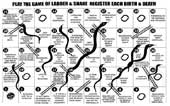 |
| The Calcutta Municipal Corporation board game |
A board game for life and death. Players get a choice of both. Close your palms, shake the dice well and roll it out carefully. There’s the ladder to your left on block 16 that asks: “Are you a senior citizen?”
Sorry for the bathos, but this is the Calcutta Municipal Corporation’s idea of spreading awareness about life and death registration. Through a snake and ladder game. If you go to block 24, you’ll know: “Birth certificate helps for availing concessions.” From block 47 you can slither down the biggest snake, straight to block 4, and learn: “Sex determination prior to birth is crime a punishable offense against humanity.” We haven’t edited the text.
The civic body will introduce this board game, possibly as advertisement, shortly. There are 50 blocks on the board, instead of the usual 100, and there are nine snakes, two almost intertwined because of an unknown symbolism, and 12 ladders. Each carries an awareness-building message in English: You also can’t get an admission to a school, old-age pension, passports and photo-identity cards without certificates of birth and death. Try and imagine yourself as Antonius Block — the medieval knight who plays chess with Death in Bergman’s The Seventh Seal — and also wonder why this obsession with board games to spread knowledge. Didn’t the Buladi campaign plug ludo?
Silver screen Sundays
A club is serving alternative fare. “No Bolly or Tolly,” says Prapul Singh Rawat of Princeton Club. It has reserved a couple of Sunday afternoons every month for alternative films.
Don’t hope for anti-establishment films, though. “Q”, whose brainchild project Freefilms is, explains: “Alternative does not imply propaganda films, but rather films that don’t make it to movie halls for lack of infrastructure and do not stick to formulaic linear patterns.”
Freefilms is not entirely free, however. You have to shell out Rs 100 “as cover charge for drink and snacks”.
Cromwell’s grandson
This can be asked in quizzes.
What did the great grandson of Oliver Cromwell (the mighty general who won the Civil War in England and ordered the beheading of the English king in 1649) do when he happened to witness a mighty cyclone in Calcutta?
Nothing special, except hiding with his family under the stairs of a riverside house throughout the night, watching doors flinging apart and wistfully thinking of the Rs 6,000 of merchandise lost while the strong winds swept freight ships ashore.
On the night of 30 September 1737, Sir Francis Russell, Cromwell’s great grandson and an East India Company merchant, experienced horror he “never saw or heard of”. Barks of ship, weighing 60 tonnes, were blown over the treetops 10 km up into the land from the Hooghly.
Around 3,000 people were killed as the massive storm wrecked 20,000 ships, sloops and boats harbored near Calcutta.
The storm also drowned a “prodigious Quantity of Cattle of all sorts, a great many Tygers, and several Rhinoceroses”, according to an account published in June 1738, in The Gentleman’s Magazine.
“Our church steeple was blown down, as also eight or ten English houses, and numbers belonging to the black merchants,” wrote Francis Russell in his account of the storm in December 1737. Russell mentions that Calcutta “looked like a place that had been bombarded by an enemy.” But nowhere does he, or the different newspaper reports, speak of waterlogging in the city streets.
(Contributed by Deepankar Ganguly, Romila Saha and Deeptanil Ray)










